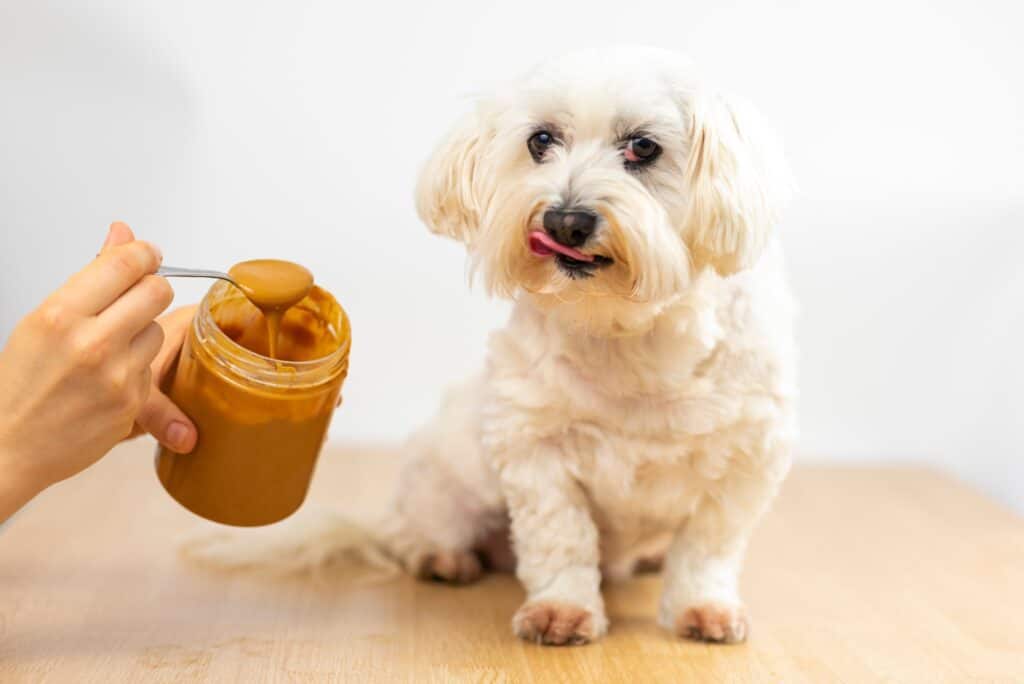Types Of Dog Brushes
Grooming your dog regularly helps minimize shedding, control where that loose hair falls, and improve the health of your dog’s

People love sharing food with their dogs–and boy, do dogs love eating “people” food! It’s so tempting to offer Fido a french fry, especially when it makes him so happy. In fact, there’s an entire industry around making pet food look like human food (dog bakeries, anyone?). However, one food has managed to raise quite a bit of controversy in the dog world over the past decade. It’s sweet, salty, creamy, and hilarious to watch dogs try to lick up.
Oh yes, we’re talking about peanut butter.
What kind of peanut butter can dogs eat? What about other nut butter like cashew or almond? Is peanut butter toxic for dogs? With just how much information–and misinformation–is out there regarding pets and their diets, it can be hard to know who or what to trust. So, can dogs eat peanut butter? Yes (…and No).
Table of Contents
When it comes to dogs and peanut butter, there are really 3 things to take into consideration; allergies, calories, and sweeteners.
Although it is uncommon, some dogs have nut allergies. Try exposing your dog to a small amount of peanut butter (or any other kind of nut butter), and observe how they act. Common symptoms of a nut allergy in dogs include diarrhea, vomiting, red and itching skin, difficulty breathing, and even hair loss.
If you think your dog is having an allergic reaction, contact your veterinarian immediately. Additionally, peanut allergies are common among humans–you might consider only giving your dog peanut butter at home, and not in public places where a stranger could experience an allergic reaction.
Peanut butter does contain many healthy nutrients, such as vitamin B and Vitamin E, as well as niacin, healthy fats, and protein. The downside is that the fat content in peanut butter is significant, and the added calories can negatively affect your dog’s weight and digestive health.
If your dog struggles to maintain a healthy weight, only consider peanut butter as a rare treat, if you allow them to have it at all. You can try to find reduced sugar or reduced fat peanut butter for your pooch, but that leads us to sweeteners.
If you take away nothing else from this article, remember this: Xylitol. Xylitol is a sugar alcohol that is sometimes used as an alternative sweetener in human food, especially in reduced-sugar peanut butter.
It’s perfectly safe for humans, but it is deadly for dogs. Even a small amount can trigger adverse health effects in dogs, and they can occur as quickly as 10 minutes. Before you feed your dog any peanut butter or similar product, check the label and ensure that there is no Xylitol in the ingredients.
In short, as long as your peanut butter product doesn’t contain Xylitol (and your dog doesn’t have a peanut allergy), peanut butter is safe for your dog to eat. Peanut butter treats specifically made for dogs are a safer alternative.
Other ‘safe’ nut butters for dogs include cashew, hazelnut, and almond. Hazelnuts themselves are also safe to give dogs, though they can be a choking hazard for smaller breeds.
In terms of almond and cashew butter, exercise a bit of caution. Almonds and almond products are non-toxic for dogs, but they can be difficult for dogs to digest. Cashews, on the other hand, are safe unless they are raw.
If it contains Xylitol, it is toxic for your dog. Do not allow your dog to lick or consume anything with Xylitol in it. Additionally, never allow your dog to consume a nut butter that contains chocolate, as chocolate is also toxic for dogs.
Finally, pistachios, pecans, walnuts, macadamia nuts, or any nut products containing these 4 types of nuts are toxic for dogs. This is especially true of walnuts and macadamias. Contact your veterinarian immediately if your dog eats anything related to walnuts or macadamias.
While many peanut butter products are safe for dogs–so long as they don’t contain Xylitol–be sure to keep in mind your dog’s dietary needs. Treats should consist of no more than 10% of your dog’s daily calorie intake, and the high-fat content of peanut butter can cause weight gain and stomach problems if consumed in large doses.
Additionally, some dogs (and people) can be allergic to nuts, so you should be mindful of where you allow your dog to eat peanut butter products. When in doubt, contact your veterinarian with any questions you have regarding your dog’s diet.
 Ashley
Ashley
Grooming your dog regularly helps minimize shedding, control where that loose hair falls, and improve the health of your dog’s
Have you begun to notice a little more cat fur around the home than you are used to? Most cat
A slicker brush is one of the most essential tools in your dog grooming arsenal. This product can do it
TO GET 15% OFF ON ALL YOUR PURCHASES